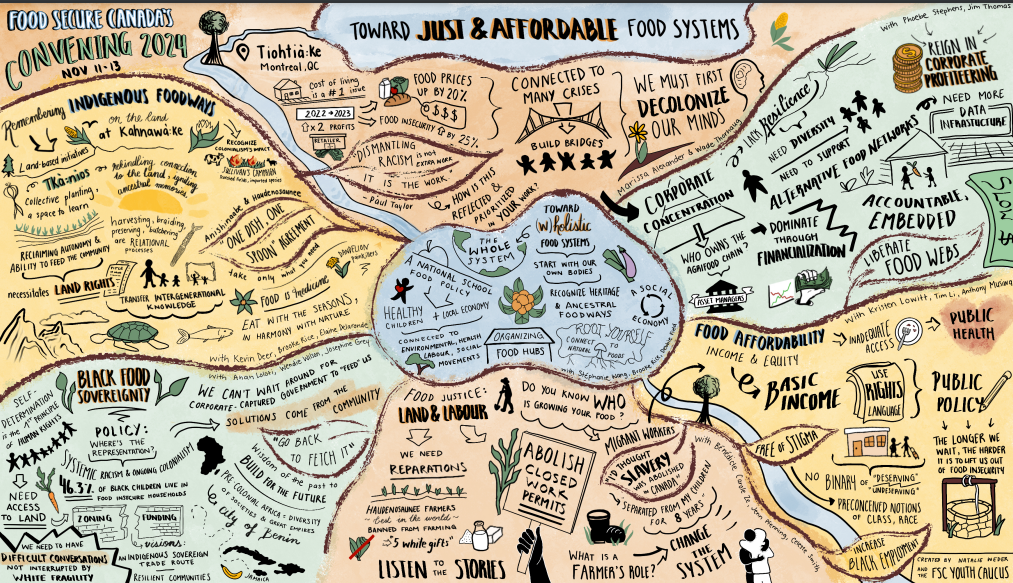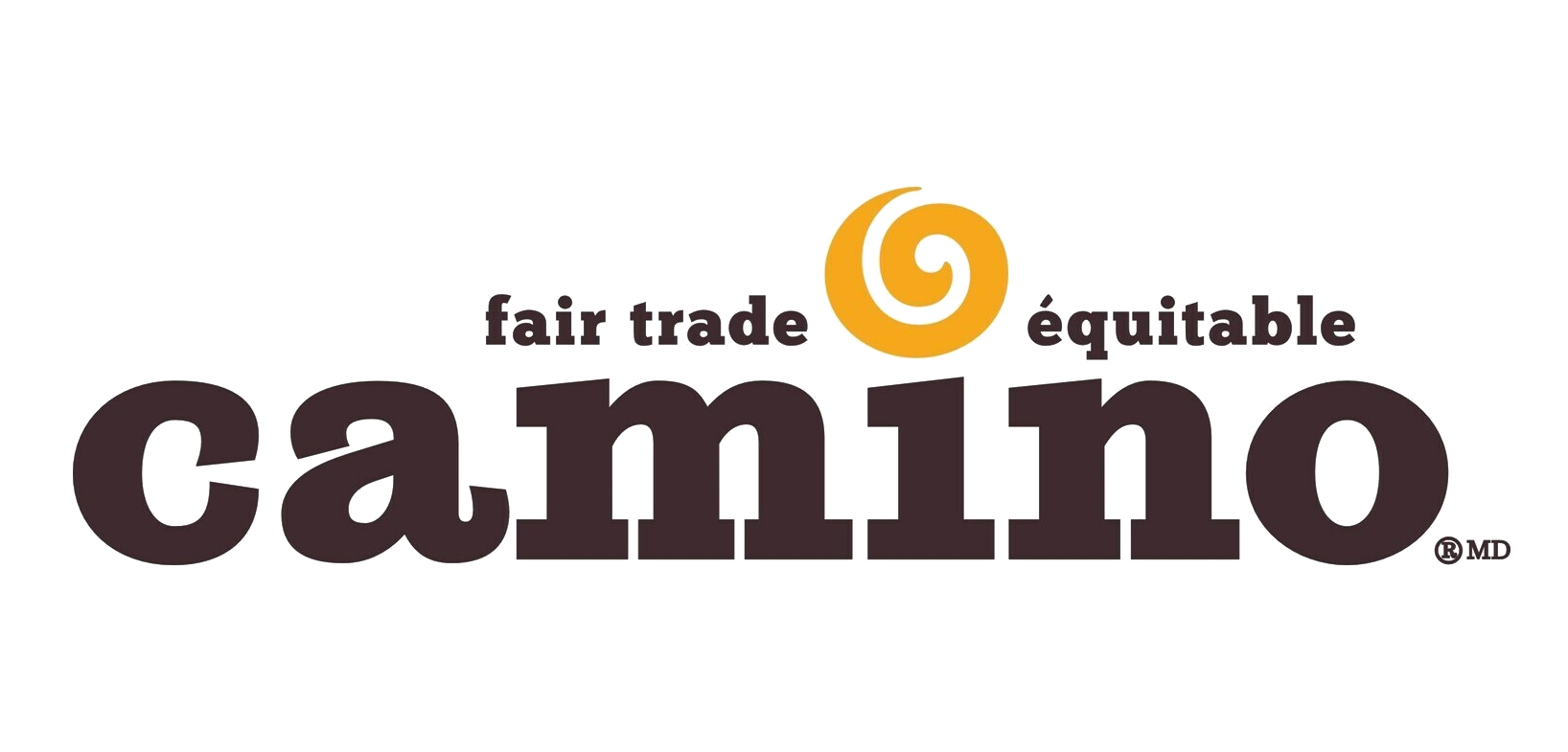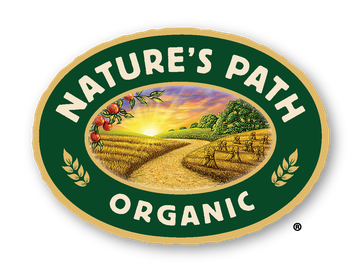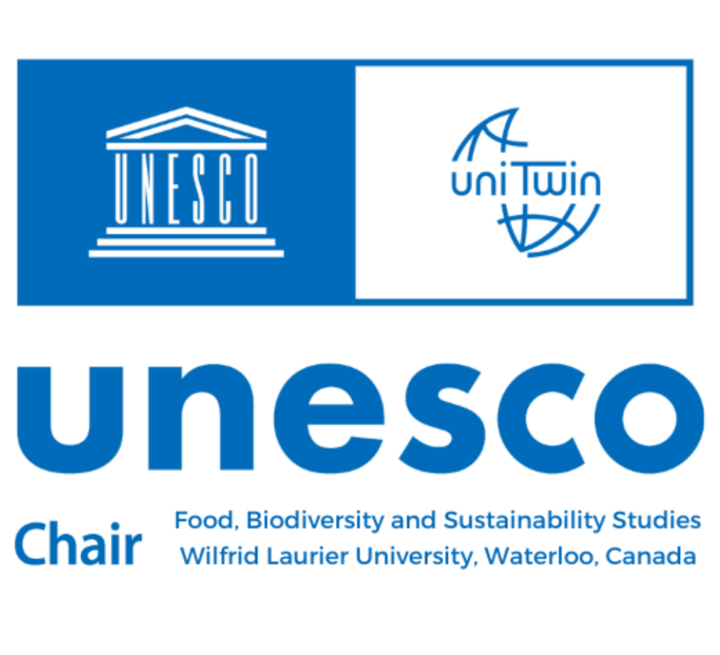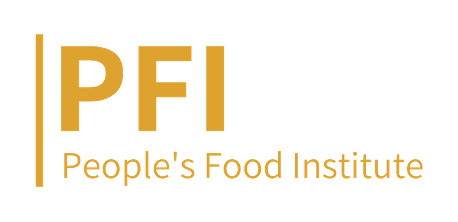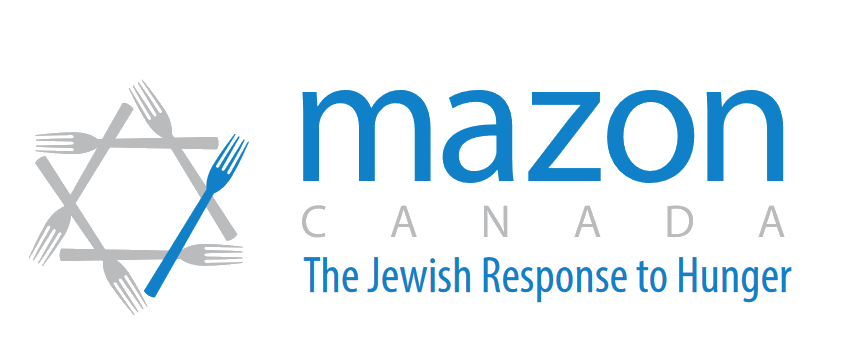On November 11-13th, 2024, Food Secure Canada (FSC) hosted its national event Convening 2024: Toward Just and Affordable Food Systems in Kahnawà:ke and Tiohtià:ke (Montréal). Food insecurity and prices spiral ever upwards, and patterns of hunger reflect Canada’s ongoing colonialism and structural racism. Convening 2024 came at a critical time to engage in deep and generative conversations about food justice and affordability.
This convening was the first in-person event FSC has hosted since 2018, and it was worth the wait. While Food Secure Canada has over 20 years of experience helping to build food movements from coast to coast to coast, in recent years we have been re-imagining our role. We left the convening reaffirmed in FSC’s role in catalyzing food systems change, and that in-person events are crucial to affect change and build connections. More than a conference, this convening was an opportunity to highlight important conversations towards creating fairer food systems, but most importantly it was a rich and vibrant human experience.
![Copy Of Quiet Room[1]](https://foodsecurecanada.org/wordpress/wp-content/uploads/2024/12/Copy_of_Quiet_room1-edited-scaled.jpg)
The format was one that emphasized connection. The focus was the plenary sessions, to ensure that conversations were happening communally rather than concurrently. Ample time was provided between plenaries to allow for organic interactions, there were several separate networking sessions, and a quiet space was made available to decompress and seek therapeutic assistance if needed. Participants were also invited to self-organize and host discussions on issues of importance to them, as well as to participate in an interactive timeline to highlight our achievements over the decades.
We aimed to promote safety, inclusion and diversity in this Convening, and while this was by no means perfect we were grateful for the opportunity to continue learning on how best to bring people together. FSC has a long history, not all of it exemplary–the 2018 Assembly ended with a boycott by its BIPOC attendees. There remain many unanswered questions on how to create the spaces we need for conversations on food systems, and we look to our movement for answers.
![Copy Of Lunch Cabaret[1]](https://foodsecurecanada.org/wordpress/wp-content/uploads/2024/12/Copy_of_Lunch_Cabaret1-1024x640.jpg)
As we enter a federal election year, we need to find the motivation to continue the work that we do. While change often seems too little and too late, it is worth reminding ourselves how far we have come in many important ways. Some of the topics we discuss, while not yet actionable, would have been inconceivable at a conference just a generation before. The path towards change starts with people getting together, working through their differences, and finding common ground. Moving forward, our goal is to help create those spaces, and amplify the voices of those across the food movement.
What follows is a summary of each day of the convening:
Convening Day 1- Connect with the land
![Copy Of Convening-brooke-kahnawà Ke-3[1]](https://foodsecurecanada.org/wordpress/wp-content/uploads/2024/12/Copy_of_convening-Brooke-Kahnawa_ke-31-edited-scaled.jpg)
The first day was held in Kahnawà:ke, the traditional and unceded territory of the Mohawk Nation, and connecting with the traditional lands, practices, and peoples was a great way to ground ourselves in the importance and privilege of coming together. Elder Kevin Deer opened the convening by grounding us in the history of the land and the peoples who have cared for it since time immemorial. Using joy and song, he reminded us of the history of the treaties and what the Wampum belts signify: peace, friendship, and respect–values to guide us as we walk alongside each other towards equity, justice, and wellness.
Knowledge-keeper and Seed-saver Elaine Delaronde shared core memories of her grandfather saving his own seeds, an inspiration for the work she does now. Taking us through the seasons, Elaine passed on wisdom and encouragement about the power there is to be found in traditional foods, medicines, and recipes–even the humble dandelion forms a powerful painkiller. Her Haudenosaunee garden workshops demonstrated the power of community coming together to grow food, eat together, and share knowledge.
After a beautiful meal from the land, Brooke Rice shared her keynote presentation on Reclaiming Indigenous Food Sovereignty. She spoke to colonialism, and how the replacement of traditional harvesting with European farming styles continues to impact Indigenous connections to the land. She reminded us of the One Dish, One Spoon agreement between the Aniishnabeeg and Haudenosaunee that ensures sustainable practices and principles. Brooke taught us that it is not about reclaiming these practices, but about remembering them because the ancestral memory has not been forgotten.
Convening Day 2- Connect with the people
The second day of the convening was held in Tiohtià:ke (Montreal) at the historical Rialto Theatre. The co-executive directors opened the day with reflections, setting the scene for connection and relationship-building, and highlighting the many ways attendees could be involved in food conversations in an effort to encourage inclusion, accessibility, and collaboration.
![Copy Of Black Food Sovereignty Panel[1]](https://foodsecurecanada.org/wordpress/wp-content/uploads/2024/12/Copy_of_Black_Food_Sovereignty_Panel1-1024x669.jpg)
Our first plenary of the day was Black Food Sovereignty: Visions, Lessons, & Challenges, brought to life by Black food activists Wendie Wilson, Josephine Grey, & Anan Lololi. They drew attention to the links between present-day barriers to Black food sovereignty and the trans-atlantic slave trade. They further highlighted the good work being done despite many systemic challenges, and how allies can reframe their mindsets to centre important BIPOC voices. We were reminded that these forums need to be more diverse and we all need to actively make that happen. Wendie noted that, “what is not OK is people interfering in the work that we need to do with community and thinking that they know better.” Josephine powerfully noted the limitations of capitalist interventions, saying, “There will never be profit made from providing food to poor people.”
![Copy Of Food Justice Land And Labor[1]](https://foodsecurecanada.org/wordpress/wp-content/uploads/2024/12/Copy_of_Food_Justice_Land_and_Labor1-683x1024.jpg)
The second plenary, Food Justice, Land, & Labour, brought together speakers with experience on the land, Bénédicte Carole Ze, Celeste Smith, and Jen Pfenning. Through sometimes challenging and emotional storytelling, the speakers raised the importance of connecting to the land, but also to each other as individuals with empathy, care and reconciliation. Bénédicte spoke of her challenging experience through the Seasonal Agricultural Worker Program but noted, “I don’t want pity, my story made me the woman I am.” They highlighted the types of conversations that can be had among those impacted by colonization, despite very differing lived experiences, and noted the overlap between workers’ rights and Indigenous rights. We were reminded that guilt and shame don’t solve the issues–we all need to find our role in this shared work.
![Copy Of Stephanie - (w)holistioc Food Systems[1]](https://foodsecurecanada.org/wordpress/wp-content/uploads/2024/12/Copy_of_Stephanie_-_wholistioc_food_systems1-edited-scaled.jpg)
Our last plenary of the day was Toward (W)holistic Food Systems with Rachel Cheng, Brooke Rice, Stephanie Wang, and Debbie Field. Here, the speakers highlighted the impact of unique, wholistic food programs and how they can be part of the path toward just and affordable food systems. They shared successes, challenges, and moments of growth working in alternative food systems solutions. As Brooke eloquently put it, “Our collective work is like a basket that we weave together.” Debbie noted that school food programs are one of the largest and easiest food systems transformation levers because they involve local employment, farming, and economies.
In the evening the North American Digital Agriculture Working Group hosted a reception. They highlighted how digital agriculture impacts different sectors and invited attendees to engage in discussion and exploration on the issue. Discussions included impacts on environment, workers rights, income, and data ownership, and how digital agriculture impacts in ways we aren’t even aware such as using data gathered to influence farming prices, control the sector, and replace workers.
![Copy Of Lunch Gathering[1]](https://foodsecurecanada.org/wordpress/wp-content/uploads/2024/12/Copy_of_Lunch_gathering1-1024x640.jpg)
Convening Day 3- Connect with the policy
![Copy Of Corporate Profit Panel & Mentimeter[1]](https://foodsecurecanada.org/wordpress/wp-content/uploads/2024/12/Copy_of_Corporate_Profit_Panel__Mentimeter1-edited-scaled.jpg)
Day 3 started off strong with Reigning in Corporate Profiteering in Food Systems with Phoebe Stephens and Jim Thomas. Food prices have grown by 20% since 2020, double that of other goods, to the point that food costs are the highest priority concern for people in Canada. This is in great part due to high market concentration in food retail, but also other sectors like distribution, energy, and agricultural inputs. Meanwhile, initial research shows that alternative food systems like farmers markets don’t increase prices as much. The corporate food system is highly financialized, with philanthropy, public pension funds, and governments having a large role. They emphasized that food should not be a commodity, nor a source of profit, nor should we arrange food systems around profits. They reiterated the importance of alternative and (w)holistic food systems as part of the solution, as well as price caps on basic goods, windfall taxation of corporations, and campaigns for divestment by public funds in the corporate food system. As Jim emphatically stated, “We need to defund agribusiness and refund food sovereignty.”
![Copy Of Income & Equity Panel[1]](https://foodsecurecanada.org/wordpress/wp-content/uploads/2024/12/Copy_of_Income__Equity_Panel1-edited-scaled.jpg)
The next plenary of the day was Food Affordability: Income & Equity with Tim Li, Kristen Lowitt, and Anthony Musiwa. They grounded the session in the food insecurity data, highlighting the gaps when it comes to appropriate representation from territories, Indigenous communities, and unhoused peoples, as well as noting the lack of intersectionality demonstrated in the data, such as the sustainability or cultural relevance of food. Tim noted, “Not everyone in the household experiences food insecurity in the same way.” They explored tools such as basic income and federal income support through existing infrastructure. Anthony pointed out that, “This [federal election] is an opportunity to mobilize, to band together to address these issues.”
![Copy Of Question Period[1]](https://foodsecurecanada.org/wordpress/wp-content/uploads/2024/12/Copy_of_Question_Period1-edited-scaled.jpg)
The last session of the day was Question Period, opened by Rachel Bendayan, Liberal MP for Outremont and where audience members engaged with Yves Perron, Bloc MP for Berthier—Maskinongé; and Nimâ Machouf, NDP candidate for Laurier—Sainte-Marie. Attendees asked questions about food labelling, equity in future school food programs, food insecurity, and supporting domestic production and processing of foods. Both Nima Machouf and Yves Perron committed to a target of reducing food insecurity by 50% in 2030, and eradicating severe food insecurity. The event was a great demonstration of how FSC’s Eat Think Vote campaign will look, which invites electoral candidates to have discussions with local community groups about food, from coast to coast to coast, and reminds us that civil society is a powerful advocacy machine to move us toward the future food systems we need.
After a closing from the co-executive directors, the evening transitioned to a ten-year celebration of the Coalition for Healthy School Food. Advocates for healthy school food programs, Debbie Field, Mustafa Koç, and Wendie Wilson took to the stage to speak to the importance of civil society in policy advocacy and design, while also celebrating the many recent victories of the Coalition’s advocacy efforts. School food programs are a valuable tool to moving toward just, healthy, and sustainable food systems.
Conclusion
There are so many individuals, groups, organizations, and networks doing imperative work toward just, healthy, and sustainable food systems. Convening 2024 brought many of them together. We may not know yet what amazing initiatives will be born from the event, but we could already see the potential for change when people are brought together in one place. We are more powerful when we work together. We were reminded of the importance of grounding the gathering in BIPOC learnings and leadership, while also acknowledging that these same voices are still not represented in these spaces enough, despite being overly represented in food insecurity data.
The convening wasn’t just a space for dialogue—it was a celebration of the people driving meaningful change. Food Secure Canada extends heartfelt gratitude to every team member and volunteer whose dedication, smiles, and tireless efforts made this gathering unforgettable. And to everyone who participated, thank you for shaping the success of Convening 2024. Together, we take bold steps toward just and affordable food systems for all.
